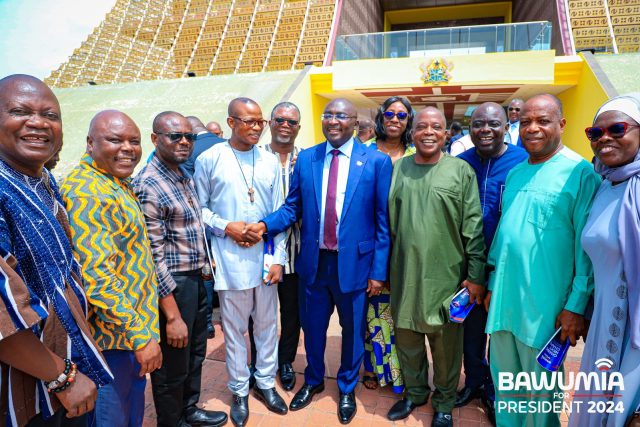The Vice President and flagbearer of the governing New Patriotic Party (NPP) Dr. Mahamudu Bawumia has reiterated his commitment to engaging the private sector more in the provision of infrastructure for free Senior High School (SHS) and other levels of education as well as all sectors of the economy.
Dr. Bawumia announced this when he engaged in constructive talks with the National Executive of the Conference of Heads of Assisted Secondary Schools (CHASS) in Accra on Monday.
The meeting yielded promising insights into refining the free SHS policy and advancing broader educational reforms.
Vice President Bawumia used the opportunity to articulate his forward-looking vision, emphasising his plans for an enhanced credit system in bolstering the educational infrastructure and supporting teaching and non-teaching staff.
Dr. Bawumia who initially announced his proposals during his address at the University of Professional Studies, Accra (UPSA) on February 7, 2024, outlined a strategic framework aimed at addressing the key challenges facing Ghana’s educational landscape.
He underscored the importance of collaborative efforts in shaping policies that not only address immediate challenges but also lay the foundation for a more robust and inclusive education system capable of driving Ghana’s socio-economic development.
Central to Dr. Bawumia’s plan is to incentivise the private sector to be involved in building critical infrastructure such as dormitories and classrooms.
Under this scheme, the government will rent these facilities from private developers over a designated period, eventually assuming ownership.
The Vice President’s proposal also includes provisions for leasing buses to schools, thereby mitigating the burden of upfront government expenditure and circumventing delays commonly associated with infrastructure projects funded through the Ghana Education Trust Fund (GETFUND).
“My administration will incentivise the private sector to complement government in the provision of many infrastructure and other services to reduce government expenditure and improve maintenance.
“The private sector will be encouraged to build roads, schools, hostels, and houses for government to rent or lease to own. The demand for road construction is massive, and this has historically placed a huge burden on the budget. I believe that the private sector should finance the construction and maintenance of roads through PPP concession arrangements,” the NPP flagbearer for the 2024 general election reiterated.
This policy, according to Dr. Bawumia, will reduce the educational infrastructure deficit, improve maintenance, enhance the quality of education, and at the same time improve the management of government expenditure.
The meeting with CHASS is the latest in the series of engagements the NPP flagbearer has been having with key stakeholders to explain his policies to them and also seek their input.
THE CUSTODIAN has gathered that the Vice President’s proposition has resonated strongly with the leadership of CHASS, who expressed enthusiasm for its potential to alleviate the educational infrastructure deficit, streamline maintenance efforts, and elevate the overall quality of education.
It is envisaged that by leveraging private sector resources and expertise, the initiative will enhance the efficiency and effectiveness of government spending while expanding access to essential educational facilities.
With stakeholders aligned behind a shared commitment to innovation and progress, the stage is set for transformative changes that promise to enrich the lives of generations of students to come, and at a faster pace than what existing funding schemes have allowed.
CHASS’ contribution
Meanwhile, Vice President Bawumia has acknowledged the valuable input from the executives of CHASS, recognizing their contributions towards enhancing the free SHS policy and addressing broader educational issues.
He asked for their full support in the implementation of the policies he outlined when he is elected as the President of Ghana.









































